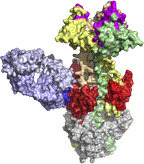RT @KoontzOncology: Great #oncopharm review on monoclonal antibodies in ALL via @ASH_hematology --> http://t.co/R6GtGm5YPx
Abstract
With modern intensive combination polychemotherapy, the complete response (CR) rate in adults with acute lymphoblastic leukemia (ALL) is 80% to 90%, and the cure rate is 40% to 50%. Hence, there is a need to develop effective salvage therapies and combine novel agents with standard effective chemotherapy. ALL leukemic cells express several surface antigens amenable to target therapies, including CD20, CD22, and CD19. Monoclonal antibodies target these leukemic surface antigens selectively and minimize off-target toxicity. When added to frontline chemotherapy, rituximab, an antibody directed against CD20, increases cure rates of adults with Burkitt leukemia from 40% to 80% and those with pre-B ALL from 35% to 50%. Inotuzumab ozogamicin, a CD22 monoclonal antibody bound to calicheamicin, has resulted in marrow CR rates of 55% and a median survival of 6 to 7 months when given to patients with refractory-relapsed ALL. Blinatumomab, a biallelic T cell engaging the CD3-CD19 monoclonal antibody, also resulted in overall response rates of 40% to 50% and a median survival of 6.5 months in a similar refractory-relapsed population. Other promising monoclonal antibodies targeting CD20 (ofatumumab and obinutuzumab) or CD19 or CD20 and bound to different cytotoxins or immunotoxins are under development. Combined modalities of chemotherapy and the novel monoclonal antibodies are under investigation.
Via Krishan Maggon



 Your new post is loading...
Your new post is loading...












Volume: 125Issue: 26Pages: 4010 - 4016DOI: http://dx.doi.org/10.1182/blood-2014-08-596403 June 25, 2015; Blood: 125 (26)Review Series: Acute Lymphoblastic LeukemiaMonoclonal antibodies in acute lymphoblastic leukemiaElias Jabbour, Susan O’Brien, Farhad Ravandi, and Hagop Kantarjian